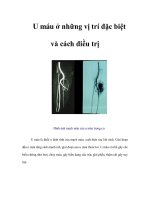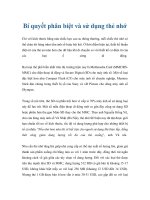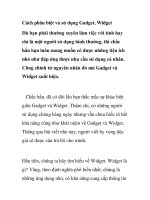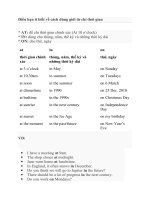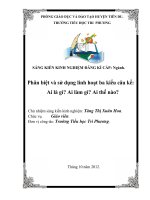Những từ cần phân biệt và cách dùng
Bạn đang xem bản rút gọn của tài liệu. Xem và tải ngay bản đầy đủ của tài liệu tại đây (110.76 KB, 11 trang )
The compiler by ANH TRÌNH
**END UP/BE UP TO
Gareth Rees:
Well Yana, thank you for your question which, as you say, is about phrasal or
multi-word verbs. These are verbs which have more than one part and they can be
difficult for learners of English partly because there are so many and also because
they often have more than one meaning.
The two you've chosen though are not so difficult. First of all 'to end up' means to
reach a final position. For example, about travel: "They are travelling across
Europe by train and they'll end up in Paris. From there, they fly back to the US."
Or, another example, from life: "I studied medicine at university but I ended up
working for an accountancy firm." In that second example, the final job for the
person was as an accountant even though they started by studying medicine. They
'ended up' working as an accountant.
Now, 'to be up to' has two meanings. The first means that someone is capable of
doing a task or facing a challenge. For example: "She's up to the job. In fact, she'll
probably deliver the report early." Here the woman is definitely able to do the job.
She's 'up to' the job.
The second meaning, and I think it is the more common one, is similar to 'to do
something'. If a father hears his children making a noise he might shout: "What are
you up to?" and he wants to know what they are doing. This meaning of 'to be up
to' is often used when you are suspicious of something. You think someone is
behaving in a strange way and you don't know why they are doing something. For
example, a teacher sees three students go into an empty classroom. The teacher
might say: "Did you see those students go in that room? What are they up to? Let's
go and have a look."
Now, this phrase, 'to be up to' is also used to talk about someone's free time. For
example: "What are you up to this weekend?" is an informal way to ask what
someone is doing over the weekend, to ask if they have any plans.
So, I think I've ended up at the end of the explanation, I hope it has helped. By the
1
The compiler by ANH TRÌNH
way Yana, what are you up to tonight?
Gareth Rees has been an English language teacher and teacher trainer for over 10
years. He is currently a lecturer at London Metropolitan University and his first
course book for English Language learners is due to be published in 2007.
KNOW/KNOWING:
Gareth Rees:
Wojciech, thank you for your question. First of all, in a sense, there are two types
of verbs, action verbs and state verbs. Action verbs include ones like kick, take, do.
State verbs include ones like have, be, know, believe. Interestingly, state verbs
often describe things connected to our minds and thoughts, as well as possession
and existence. To be or not to be for example.
It is indeed unusual for a verb with a state meaning to be used in the continuous
form. This is because the continuous form suggests something is temporary and of
limited duration, usually happening at a specific time, for example; "At the
moment, I am working on a computer."
However, a state is something which has a feeling of permanence or unlimited
duration. For example: "The sun is the source of energy."
So, we say 'I know my Father', not 'I am knowing my father', because the
relationship feels permanent, and it is a state of knowledge not an activity. You
either know your father or you don't. To know or not to know, that is the example.
However, there some verbs which usually have a state meaning, but can sometimes
have an action meaning. 'Think' is a good example of this. Here are two examples:
"What do you think of the weather in your country?"
"Hey David, you seem worried. What are you thinking about?"
In the first example, think has a state meaning - what is your opinion? In the
2
The compiler by ANH TRÌNH
second example think has an action meaning. David is actively thinking hard about
something. His friend can see this in his face, we can imagine the engine in his
brain working. So, we can therefore use the continuous form because it is now an
action verb. And, we want to give a meaning of temporary action happening now
'What are you thinking about? Tell me!'
Finally, a few more examples of the verbs which are rarely used in the continuous
but could be. First of all: "I have a brother" , "I can't talk now. I'm having dinner."
In the first one, to have a brother, is a permanent state of existence. You either have
a brother or you don't. In the second one have describes the action to eat dinner, to
have dinner. This is an action so we can say "I'm having dinner."
And lastly the verb 'to love'. This is a state of emotion and is normally used in the
simple form, not in the continuous form. "I love ice-cream", "I love my wife".
However there is one popular example at the moment which is used by an
American restaurant company in their advertising. They simply say for the
experience of eating in their restaurant, "I'm loving it".
Gareth Rees has been an English language teacher and teacher trainer for over 10
years. He is currently a lecturer at London Metropolitan University and his first
course book for English Language learners is due to be published in 2007.
CAN/COULD:
Sian Harris answers:
This is a common area for questions, as these verbs can have several functions.
Without going into too much detail, I'm going to try and illustrate the key uses for
you.
Firstly, we use 'can' for something that is possible or to show that somebody has
the ability to do something in the present and future. For example:
We can see the park from our house,
3
The compiler by ANH TRÌNH
Or
Ella can speak fluent Japanese.
The negative here is 'can't'...as in: He can't swim very well.
In this case, 'could' is generally used as the past form of 'can'. So,
Ella could speak fluent Japanese when she was young, and she can speak several
other languages now too.
Or:
When I was a child I could run fast.
We use 'could' for general past ability, but be a little bit careful here, because when
we're talking about what happened in a particular situation, we tend to use
'was/were able to' for past ability instead:
For example: The fire spread quickly, but luckily everybody was able to escape.
We also use 'could' to talk about possible actions now and in the future - here the
function is possibility (not ability) - and this is what tends to cause the confusion
around these words. For example, if you are expecting some friends to visit, but
they have been delayed, you might say 'they could arrive at any time now', or if
you're trying to make progress with your work you might ask 'Could we talk to the
boss again? For this function of possibility, we need to watch out for the past form,
as this doesn't work in exactly the same way. If we want to express past possibility,
we need to use could + have and the past participle (have done, have been etc).
Let's imagine you've received a letter or card from a mystery admirer, and you're
trying to work out who sent it to you. As the sending happened in the past, we are
speculating about a past possibility. 'John could have sent it' but perhaps 'James
could have written it'...we are not sure who, but think there are some possibilities.
Finally, let's look at how we commonly use can/could in question forms to make
requests (or ask for things). If we go shopping for clothes, we might ask 'can/could
I try that dress on please?' or 'could I see those shoes in blue.' Here, either 'can' or
'could' may be used without significant difference. The only thing worth noting is
that in terms of register, that is (style and formality), 'could' is considered slightly
4
The compiler by ANH TRÌNH
more formal or polite.
So, to recap, three of the main functions for 'can/could' are to talk about: ability,
possibility (with the change in the past form to remember) and for requests.
Sian Harris is the Manager of English Language Training & Development at the
BBC World Service, and runs specialist courses in London and overseas for BBC
staff. Before joining the BBC, she spent 10 years as an English language teacher,
examiner and academic manager in schools and colleges in London.
THINK OF/THINK ABOUT
Sian Harris answers:
Hi Cecile and thanks for your question - prepositions are a very tricky area! This is
also what's known as a collocation issue...which means we need to look at which
words work best in partnership with 'think of ' and 'think about.'. Basically, 'think
of' usually means 'imagine' whereas 'think about' tends to mean something closer to
'consider', so the differences would arise in certain contexts. For example, if I say
I'm thinking of a tropical beach, please don't interrupt me! I mean I'm imagining it
or daydreaming about it. However, a sentence like 'they're thinking about whether
to agree to the sale,' means they're considering the sale. In these cases, it's just
natural usage patterns that tend to favour one form over another
But when we are talking about people, we often tend to use them both in a similar
way: For example, if my friend had an accident and went to hospital, I might send
a card and some flowers with a message which could either read: 'I'm thinking of
you,' or 'I'm thinking about you', and the meaning wouldn't be significantly
different.
I hope that helps Cecile - thanks for your question.
Sian Harris is the Manager of English Language Training & Development at the
BBC World Service, and runs specialist courses in London and overseas for BBC
5


